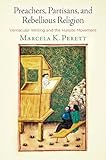Preachers, Partisans, and Rebellious Religion : Vernacular Writing and the Hussite Movement / Marcela K. Perett.
Material type: TextSeries: The Middle Ages SeriesPublisher: Philadelphia : University of Pennsylvania Press, [2018]Copyright date: ©2019Description: 1 online resource (304 p.)Content type:
TextSeries: The Middle Ages SeriesPublisher: Philadelphia : University of Pennsylvania Press, [2018]Copyright date: ©2019Description: 1 online resource (304 p.)Content type: - 9780812295399
- 284/.3094371 23
- online - DeGruyter
| Item type | Current library | Call number | URL | Status | Notes | Barcode | |
|---|---|---|---|---|---|---|---|
 eBook
eBook
|
Biblioteca "Angelicum" Pont. Univ. S.Tommaso d'Aquino Nuvola online | online - DeGruyter (Browse shelf(Opens below)) | Online access | Not for loan (Accesso limitato) | Accesso per gli utenti autorizzati / Access for authorized users | (dgr)9780812295399 |
Frontmatter -- Contents -- Introduction -- Chapter 1. From Golden Boy to Rabble- Rouser: Jan Hus and His Preaching Career -- Chapter 2. Creating a Faction: Jan Hus and the Importance of Moral Victory -- Chapter 3. Battle for the Minds: Vernacular Propaganda For and Against Hussite Reform -- Chapter 4. The Parting of the Ways: Prague and Tábor -- Chapter 5. Combining Education with Polemic: The Price of Theology in the Vernacular -- Chapter 6. The Dangers of Popularizing Wyclif: The Eucharistic Debates That Fragmented Bohemia -- Chapter 7. Writing History to Shape the Future: Historia Hussitica by Lawrence of Březová and Historia Bohemica by Aeneas Silvius Piccolomini -- Conclusion -- Notes -- Bibliography -- Index -- Acknowledgments
restricted access online access with authorization star
http://purl.org/coar/access_right/c_16ec
In early fifteenth-century Prague, disagreements about religion came to be shouted in the streets and taught to the laity in the vernacular, giving rise to a new kind of public engagement that would persist into the early modern era and beyond. The reforming followers of Jan Hus brought theological learning to the people through a variety of genres, including songs, poems, tractates, letters, manifestos, and sermons. At the same time, university masters provided the laity with an education that enabled them to discuss contentious issues and arrive at their own conclusions, emphasizing that they held the freedom to make up their own minds about important theological issues. This marketplace of competing religious ideas in the vernacular emerged in Bohemia a full hundred years before the Reformation.In Preachers, Partisans, and Rebellious Religion, Marcela K. Perett examines the early phases of the so-called Hussite revolution, between 1412, when Jan Hus first radicalized his followers, and 1436, the year of the agreement at the Council of Basel granting papal permission for the ritual practice of the Utraquist, or moderate Hussite, faction to continue. These were years during which the leaders of competing reform movements needed to garner the laity's support and employed the vernacular for that purpose, translating and simplifying basic theological arguments about the Bible, the church's ritual practice, and authority in the church. Perett illustrates that the vernacular discourse, even if it revolved around the same topics, was nothing like the Latin debates on the issues, often appealing to emotion rather than doctrinal positions. In the end, as Preachers, Partisans, and Rebellious Religion demonstrates, the process of vernacularization increased rather than decreased religious factionalism and radicalism as agreement about theological issues became impossible.
Mode of access: Internet via World Wide Web.
In English.
Description based on online resource; title from PDF title page (publisher's Web site, viewed 26. Mai 2021)


